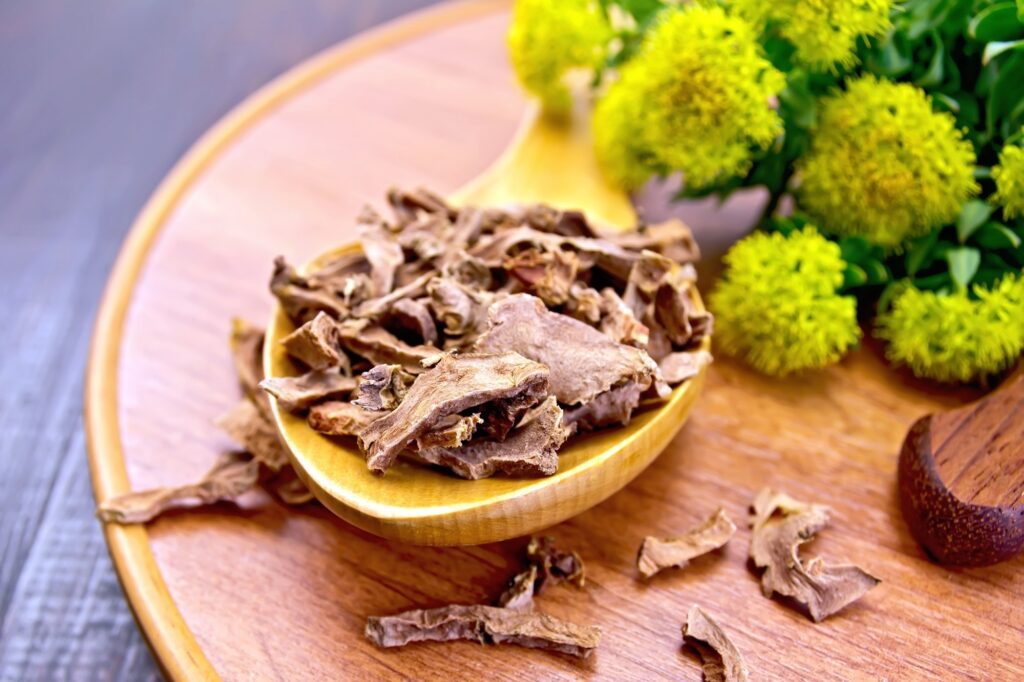
Rhodiola rosea, an adaptogenic herb renowned for its stress-reducing and performance-enhancing properties, is gaining traction in the world of modern integrative medicine. Known as ‘golden root’ or ‘Arctic root,’ this herb has a storied history of medicinal use across Europe and Asia. Recent scientific investigations have begun to substantiate its traditional claims, offering evidence-based insights into its health benefits.
This article delves into the botanical background of Rhodiola, its mechanisms of action, scientific evidence supporting its health benefits, safety considerations, and areas where further research is needed.
Botanical Background and Traditional Uses
Rhodiola rosea is a hardy herb that thrives in cold, mountainous regions such as Siberia, the Himalayas, and northern Europe. Historically, it has been a staple in various traditional medicine systems, including Russian, Scandinavian, and Traditional Chinese Medicine, where it was used to combat fatigue, anxiety, and altitude sickness.
The primary adaptogenic compounds in Rhodiola are rosavins, which help normalize stress responses, and salidroside, known for its antioxidant and neuroprotective effects. Standardized extracts typically contain at least 3% rosavins and 1% salidroside to ensure consistency.
Mechanisms of Action
Rhodiola’s effects are largely attributed to its modulation of the hypothalamic-pituitary-adrenal (HPA) axis, which regulates stress hormones like cortisol. By reducing elevated cortisol levels, Rhodiola supports a balanced stress response and helps the body return to homeostasis more quickly.
Additionally, Rhodiola enhances the activity of neurotransmitters such as serotonin, dopamine, and norepinephrine, which may contribute to its mood-lifting effects and impact on focus and energy. Its antioxidant and anti-inflammatory properties further protect against cellular damage from oxidative stress.
Scientific Evidence of Health Benefits
Stress and Fatigue Reduction
In a randomized controlled trial involving 60 patients with stress-related fatigue, those who consumed 576 mg/day of Rhodiola extract experienced a 30% reduction in fatigue symptoms after four weeks, compared to a placebo group. Similar benefits were observed in a cohort of nursing students during exams, where Rhodiola improved alertness and reduced mental fatigue.
In a larger study with over 1,100 participants, Rhodiola significantly reduced stress-associated symptoms within three days, suggesting its rapid action compared to conventional treatments.
Cognitive Function
Stress often impairs cognitive performance, but Rhodiola appears to counteract this effect. A placebo-controlled trial with military cadets under sleep deprivation showed improvements in reaction time, accuracy, and memory recall. Night-shift physicians also reported enhanced associative thinking and short-term memory following Rhodiola supplementation.
Mood and Anxiety
While research is limited, studies suggest Rhodiola may improve mood and alleviate anxiety. In a six-week study involving individuals with mild-to-moderate depression, Rhodiola extract led to significant mood improvements and reduced insomnia, with fewer side effects than traditional antidepressants.
Physical Performance and Endurance
Traditionally used by Siberian hunters and athletes to boost stamina, Rhodiola has been shown to enhance physical performance in modern studies. A double-blind crossover trial found that a single dose of Rhodiola improved endurance exercise performance and reduced perceived exertion. Elite rowers taking Rhodiola supplements experienced lower lactate levels post-exercise, indicating improved recovery.
Safety, Dosage, and Side Effects
Rhodiola is generally safe for short-term use, with effective doses ranging from 200 to 600 mg/day of standardized extract. Side effects are rare and mild, including dry mouth and dizziness. However, it is not recommended for pregnant or breastfeeding individuals due to limited safety data.
Rhodiola is not regulated under most public health policies, leading to variability in product quality. Consumers should seek out trusted brands that conduct third-party testing and consult healthcare professionals before use.
Limitations and Areas for Further Research
Despite promising results, research on Rhodiola has limitations, including small sample sizes, short follow-up durations, and methodological issues. Outcomes can vary based on extract type and dosage, and public health guidelines remain vague.
Significant knowledge gaps exist, particularly regarding long-term effects and use in diverse populations. Larger-scale trials are needed to confirm Rhodiola’s role in treating chronic conditions.
Conclusions
Rhodiola rosea is a well-studied adaptogen that supports stress resilience and reduces fatigue by modulating the HPA axis. Clinical and observational studies highlight its benefits in enhancing cognitive performance, improving mood, and increasing physical endurance, especially in high-stress environments.
While Rhodiola shows potential as a non-artificial wellness tool, caution is warranted due to product variability and limited long-term data. As interest in herbal adaptogens grows, standardized, evidence-based approaches will be crucial. Prospective users should consult healthcare professionals and choose high-quality formulations.






